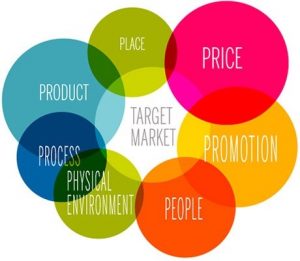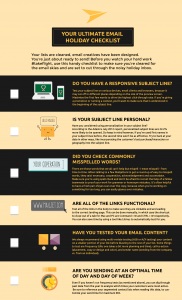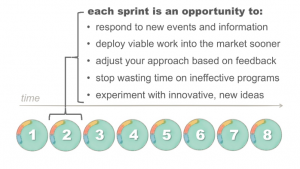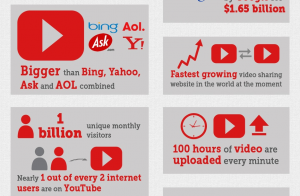With the rate Artificial Intelligence is advancing, it’s probable there will be no need for marketing in Financial Services within the next two decades. Let’s unpack that potentiality together, shall we?
In order to get there, we need to start here, with futurist Maurice Conti and his February 2017 TEDTalk on The Incredible Inventions of Intuitive AI. He posits that human kind has moved through four distinct historical eras defined by the way we work – The Hunter Gather Age, the Agricultural Age, the Industrial Age, the Information Age – and are entering our firth era, the Augmented Age. In this era, our natural abilities will be augmented by cognitive, physical, and digital nervous systems. That smart phone you might be reading this on represents a primitive, passive tool in this Augmented Age.
Conti goes on to explain that there are three types of tools. Passive, Generative, and Intuitive. Passive require manual human direction to be useful. Again, think of your smartphone, a knife, a saw. All passive tools. Generative tools use computers and algorithms to generate new designs on their own, after you’ve provided goals and constraints. As a marketer, this could be as simple as telling the AI that you need 100 leads and you have a budget of $ 1,000 and then it designs your channel distribution to achieve this goal. Intuitive tools will learn from their experience and collaborate with humans to create symbiotic augmentation.
Generative tools already exist and are widely used within Financial Services. Those risk-planning discussions you have with your advisor? They happened with the help of a computer-driven tool, didn’t they? And back in 2015, the BBC reported on Charles Schwab’s new service, Schwab Intelligent Portfolios, that used a computer to determine how to invest. The service begins with a short survey to collect your appetite for risk (constraint) and your goals – the specific definition of a generative tool.
Great, so why does that mean financial services marketers are doomed?
What would the future look like with a fully realized generative tool in action? Or an intuitive tool for that matter? Imagine a future where individuals control their own INDEPENDENT investing AI, similar to Schwab Intelligent Portfolio. And beyond just managing your investment distributions, this AI handles all things financial for this person – it manages their checking and savings accounts, investments, retirement plans, and their debts and expenses. And optimizes all these components for that specific individual. This AI does this by crunching thousands of data points, factoring in current constraints, predictive models for how things are going to change, and the individual’s goals.
In other words, all the decisions (or at least most of them) would be so heavily influenced by the AI that traditional advisors wouldn’t add much value. Why trust a flawed, potentially self-interested human when you have an AI that’s designed to maximize your value with no gain for itself? And here’s where marketing’s role ends. Because the decisions are so heavily influenced by the AI, and a key participant in the current influence network is no longer needed, there won’t be a need for marketing as we know it either. No advisors? No marketers to try and influence them. AIs making the decisions? Marketers are probably not going to start marketing to AIs (though that is possible). More likely, marketers would shift focus to trying to influence the parameters humans input into the AI. Put another way, marketers would shift more (or all) focus to trying to influence your goals and aspirations instead of getting you to select products.
Perhaps you’re rightfully feeling skeptical at this point. There’s no way I’m farming out my most important decisions to a computer you’re thinking. Perhaps you’re right. Though I’d bet you’re do this daily and don’t even think about it – every time you drive a car. Cars used to be one-to-one mechanical devices that were soon augmented with power hydraulic systems. Power brakes and power steering brought welcome enhancements to the driving experience. Today, your average car is controlled by computers as much as, if not more than, mechanical systems. Your ABS, traction and stability control systems, transmissions, engine control – all maintained by computers and making decisions on your behalf that you don’t even know about. Some of these systems are designed specifically to take away your decisions and control. And the active safety systems proliferating new models do this to an even greater degree. And we generally accept these changes over time because of the perceived improvements or in some cases, lack of choice. Most would agree, that operating a motor vehicle is made up of a series of the most important decisions – life and death decisions.
But all this isn’t going to happen tomorrow (hopefully). What will marketing’s role be during the transition?
There are literally thousands of posts out there about how marketers can use AI today to improve their effectiveness, so I won’t recap all the options here. If you’d like to explore some of the ideas, here are 2 really good resources to prime your pump: Econsultancy’s 15 Examples of Artificial Intelligence in Marketing and Inc’s 10 Examples of AI in Marketing. There are two specific ideas that I believe will have a measurable impact on marketing’s performance and illustrate a potential symbiotic relationship between marketers and their AIs.
Co-creation of programs and campaigns
You can provide insight-informed parameters to an AI – such as target audience, buying stage, budget, timing, and campaign goals – and have the AI spit out the appropriate media mix to achieve the goals within budget.
Greater personalization
Perhaps ad copy will adjust on the fly to the specific viewer. Beyond the simple if/then personalization of today, where a person is served one of a set of ads based on some criteria, this copy would literally change in real-time to be ultra-personalized. And while we’re thinking ahead, there’s the potential that advertisements would be created in real-time without any human interaction, connecting solutions to need in the most fluent way possible.
The convergence of commerce and real-life
Most articles and blogs I’ve read that address AI and marketing focus on how marketers and businesses will use AI to improve results. The intent of this post was to illustrate the other side of the commerce equation – how AI will be leveraged by buyers and how that will fundamentally change the relationship between companies and consumers.
Currently, there is a measurable distinction between commerce activities and the rest of life. You go to a store or online to make a purchase. That distinction is already blurring with things like Amazon’s Dash Buttons and will completely evaporate as AIs are used by both consumers and the companies that serve them. Consumers will leverage AIs to optimize their lives – from how they spend their time to how they spend their money. And these AIs will learn from all the data inputs we can feed them. Our content consumption, our buying habits and patterns, hell, probably even our conversations. And businesses will use AIs to create more and more personalized products and services. In this future, marketing’s role of trying to convince people to want what they’re selling will diminish. Instead, marketing’s primary purpose may be to influence the preferences and habits of the target market in order to ultimately influence the AI. Maybe marketers will ultimately end up marketing to the AIs directly.
Business & Finance Articles on Business 2 Community(76)






